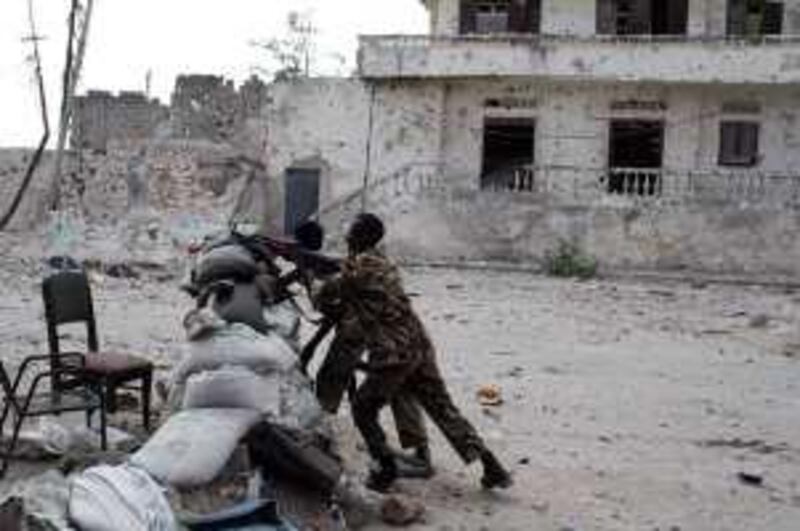NEW YORK // A UN Security Council report says that as much as 50 per cent of food deliveries to Somalia are diverted away from the 3.7 million aid-dependent Somalis who have languished in warlike conditions for nearly two decades. Instability in Somalia means transporters must truck bags of food through roadblocks manned by a bewildering array of militias, insurgents and bandits. Kidnappings and executions are common and the insecurity makes it difficult for senior UN officials to travel to the country to check on procedures.
The UN report, to be published on Tuesday, comes just after a study that showed the UN food aid for hungry Somalis is falling into the hands of Islamist militants, giving further evidence of a doomed international policy in the country. Bronwyn Bruton, who published the study, Somalia: A New Approach, last week, said the diversion of World Food Programme deliveries away from the needy illustrates the difficulty in bringing order to the lawless country. Extremist rebels known as al Shabab are fighting the western-backed transitional federal government (TFG) and pirates in the lawless Puntland state regularly raid ships in Somali waters.
Ms Bruton said peacemaking efforts by the UN, the United States and the African Union are "failing to make any difference on the ground". "Recent revelations suggesting that so much aid is falling into the hands of corrupt contractors and radical Islamic militants serves to illustrate how little control the TFG has over Somalia," said Ms Bruton, a fellow at the Council on Foreign Relations, a New York think tank.
"It adds to the list of reasons for the US and the UN to take a new approach to Somalia, one in which they should be willing to coexist with any Islamist group or government that emerges, as long as it refrains from acts of regional aggression, rejects global jihadi ambitions and agrees to tolerate the efforts of western aid agencies." The UN report, by the Security Council's Monitoring Group on Somalia, is quoted as describing a "de facto cartel characterised by irregular procedures in the awarding of contracts by the WFP" that has elevated those behind the scam to among "the wealthiest in Somalia".
Responding to the allegations, the World Food Programme's executive director, Josette Sheeran, froze any new deals with three transport contractors named in the report, highlighting the difficulty in delivering aid in Somalia and promised to probe "each and every issue" raised by investigators. The agency, which aims to feed 2.5 million Somalis this year, was forced to suspend deliveries to 625,000 food-dependent people across the south in January, after the armed Shabab groups controlling the region made "unreasonable" threats and demands.
Somalia has been racked by civil war since rebels deposed Mohamed Siad Barre as dictator in 1991. Repeated attempts by UN peacekeepers and troops from the African Union and neighbouring Ethiopia have failed to bring stability. During the 1993 Battle of Mogadishu, militia forces downed a US helicopter and killed US troops, some of whose bodies were dragged through the streets of the capital, in an incident that was later portrayed in the war film Black Hawk Down.
According to Ms Bruton's 60-page study, Somalia "has been a failed state for the better part of two decades; bereft of central government, cantonised into clan fiefdoms, and wracked by deadly spasms of violence". The creation of the UN-brokered transitional government in 2004 failed to garner legitimacy in Somalia and "produced a violent counter-reaction in Mogadishu, where a radical youth militia group - the Shabab - developed and began assassinating TFG members and supporters".
Ms Bruton warns that the "odds of the TFG emerging as an effective body are extremely poor" and urges the international community to get used to the idea of the country being run by al Shabab or a comparable alliance of Islamists. With Security Council members preparing to discuss the diverted WFP aid on Tuesday, diplomats from Somalia's mission to the UN urged the 15-nation body to stand by the shaky government, which currently controls only a few blocks of downtown Mogadishu.
Omar Jamal, the mission's first secretary, said the problem is "the absence of law and order" and acknowledged that al Shabab rebels were likely enriching themselves by intercepting aid shipments from the WFP and the UN Development Programme. "Empower the Somali government to deal with corrupt contractors, Islamists and war profiteers awash in the country," he said, according to the Associated Press.
@Email:jreinl@thenational.ae






